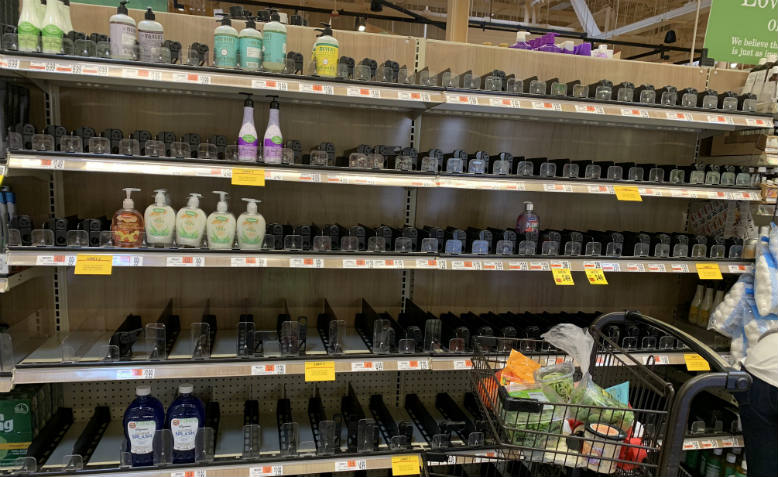 Hand sanitiser shortage. Photo: Jihane via Twitter
Hand sanitiser shortage. Photo: Jihane via Twitter
In his third note on the Covid-19 outbreak, Dr Yannis Gourtsoyannis examines the role of the market in the apparent crisis on our shelves
Dr Yannis’s second note dealing with face masks
The last few days there have been a proliferation of posts and memes expressing concern and anger at reports of supermarket shelves empty of hand sanitizers, pasta, toilet paper etc. Most of the anger in these posts is directed at ‘selfish hoarders’ and ‘bulk-buyers’. They are ‘to blame’ and they ‘need to stop’.
What I find interesting is that this image of a selfish hoarder or bulk-buyer may actually bear little relation to what is actually going on.
The walking caricature of a panicked (and yet simultaneously cold and calculating) individual buying up all the essential supplies at your local supermarket misrepresents the situation. Of course, these individuals may well EXIST, but I think that they are probably a relatively rare phenomenon.
The most likely reason for empty shelves is that countless people are making small, incremental changes to their buying choices. They are not panicked, and they are not bulk-buying, but they are making small, rational decisions to (for example) buy a hand sanitiser or two.
Where hand-sanitiser use was previously the behaviour of only a small proportion of the population, it is now the behaviour of a significantly larger portion of the population. Furthermore, as supplies start to dry up (or are breathlessly reported as drying up) a feedback loop occurs; people start thinking ‘well, I wasn’t going to change my buying behaviours but given that there is all this panic-buying I should probably make sure I buy the essentials’.
The point I am trying to make is this: there is a collective phenomenon occuring here. The empty shelves are the beginnings of a market failure rather than a result of the bad behaviour of a few bad-apples.
Crises can result in market failures. We know that. And this may well be what we are seeing here already.
But even the concept of ‘market failure’ needs unpacking.
Because, in the context of this outbreak, the market will continue to ‘work’ for some whilst it ‘fails’ for others. The costs of market failure (both monetary and in morbidity and mortality) will be borne by the majority of the population. And yet the opportunities afforded by the crisis will be seized by those in a position to seize them. And all the while we will be told that the coronovirus outbreak is some sort of ‘black swan event’ (it isn’t) and that we have little control over market behaviour (we do).
In short:
- Don’t be too quick to blame individual selfishness or mass irrationality when there is actually a systemic, market failure going on
- Recognise that market failures result in consequences that are mediated by class.
- That state intervention, and control of (including the elimination of) markets as understood, is entirely possible: it just depends on whether the public good is privileged over private profit or not

